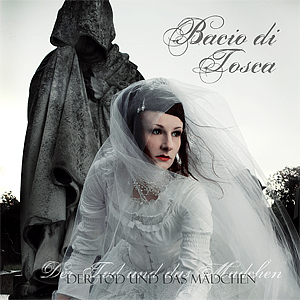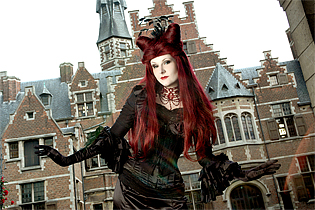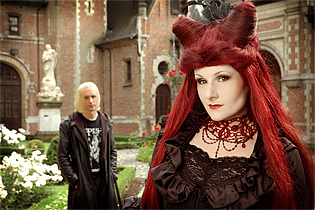 Interview with
Interview withBacio di Tosca
The dark-romantic music of BACIO DI TOSCA fascinates above all with the manifold classical chant of Dörthe Flemming, who already made herself a name as the singer of the band CHARITONA. Therefore she doesn’t simply jump on the bandwagon of nowadays popular heavenly voices bands but without exaggeration can be named one of the originators of that genre. After several years taking an artistic rest she now presents her first solo release ‘Der Tod und das Mädchen’ (Engl. Death and the girl), which can be placed in the neoclassical genre. Stylistically BACIO DI TOSCA is a recollection to the German Kunstlied (art song or lieder), popular during the romantic period. For instance Dörthe Flemming puts composers like Schubert and poets like Heinrich Heine, Mathias Claudius and Karoline von Günderrode in a new gloomy and melancholy dress - a "must have" for fans of bands like DEAD CAN DANCE, DIE VERBRANNTEN KINDER EVAS or SOPOR AETERNUS.
Question: Why was there such a long break and why CHARITONA came to an end?
Dörte Flemming: After the birth of my children, the priorities changed for a while, but it also initiated a personal maturity process. My perspective on the world and therefore my music became more authentic as it was the case with CHARITONA. I also used the “Baby break” to refine my voice, what is clearly audible in the songs. Speaking of CHARITONA, there was no “Split”. Everyone just following different directions. Private as well as artistically, but we're still connected through a deep and dearly friendship.
Q: Could you please describe the term “Art Song” more detailed again?
D.F: Sure. The “Art Song” needs - contrary to the folk song - trained singers for its performance, because its composition is very challenging. Contrary to the folk song which is created in common parlance without an author, well-known composers have been inspired by lyric poetry especially from German poets here. Some of the poets who have never been assigned with much literary value became immortal because their work inspired composers to set it to music as an art song. The personal, emotional identification of the composer obviously played a more major role than the appreciation of the poet. This matches my personal experience, because the emotional connection is important to me, when choosing the lyrics to compose the music to them.
Q: What's the meaning of the name “Bacio di Tosca”?
D.F: “Bacio di Tosca” is descended from my most favourite opera and means - translated from the Italian – “Kiss of Tosca” which is not meant lovingly because with this words “Tosca” stabs the dictator and murderer of her beloved to death with a dagger in the equally named Pucchini opera ‘Scarpia’... everyone who has ever really loved will be touched by this opera.
Q: The dagger fits perfectly to the title of the CD ‘The death and the Girl’!?
D.F: Yeah, not quite. The title is a song of Schubert, which I have arranged in a modern way for the CD. The roots of my classical musical training get visible here. During CHARITONA I was in the middle of my vocal studies, meanwhile I’ve successfully finished them. Even if my heart appends on the neo-classical gothic music, I can't deny my classical opera training of course. As far back as with 'Chariton' our trademark was to combine classical opera chant with another musical style...long before the term “Heavenly-Voices” even existed. Well, anyway no one can tell me I’m following a trend now.


Q: You spoke of your musical training. What did it include in particular and what does it mean for you to make music?
D.F: I grew up in East-Berlin. Back then other circumstances predominated and you had to catch up with high expectations even as a child. At first I associated music with the pressure to perform, because my parents sent me to violin lessons at the age of six and when other children went to the public swimming pool, I was on the way to music school with the violin under my arm. Back then, it was already a big force for me, because my parents had ambitious plans with what I had to become, so I had to go to contests and auditions regularly. Such force would cause a rebellion at several children, so the would become punk musicians. In my case, this force didn't find an outlet at first, so I escaped into dark dream worlds of H.C.Andersen, the brothers Grimm or Michael Ende. When the wall dropped and the change came, it was a big deliverance from this tight corset of control, force and the moral concepts of my parents for me. It was clear for me very early that the gothic music now provided the framework for me to live out myself personally and musically and to cultivate my accrued depressions about the fast that I had to be well-adjusted (laughs).Today I’m very glad that I came to the classical music that early because it is my foundation and therefore the tool of my creative power. You learn much faster as a child and so musical theory and classical composers belong to my childhood like “Coca-Cola” and “Disneyland” to others. Later, at the age of 13 I guess also vocal lessons were added what caused vocal studies. Of course, nowadays one doesn't have to be able to read musical scores anymore to make music, but it doesn't hurt either.
Q: The music to the track ‘Once I have to depart’ is in my opinion the melody of the choral of ‘How should I welcome you’ from the Christmas oratorio of J. S. Bach but the booklet says Christoph Kroll!?
D.F: You've been attentive (very delighted). Bach has actually used this melody in his Christmas oratorio. On the CD I’m singing the last two verses of the hymn “Oh Haupt voll Blut und Wunden” which also appears as choral in the “Matthäuspassion” of J. S .Bach. But the melody of this hymn is descended from an old dying song of Christoph Kroll... cover versions already existed in Bach's times (laughs). During my studies I sung these two verses on funerals for several times to fill up my always meaner cash box. They became very dear to my heart during that time.
Thanks for the interview. I wish you and your project all the best and much success.




